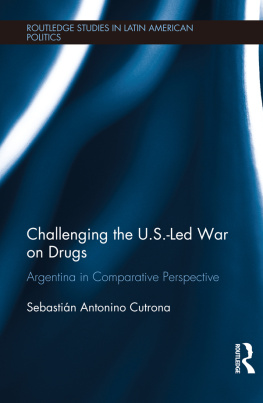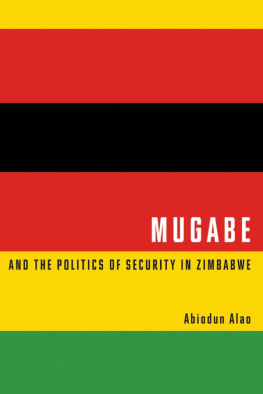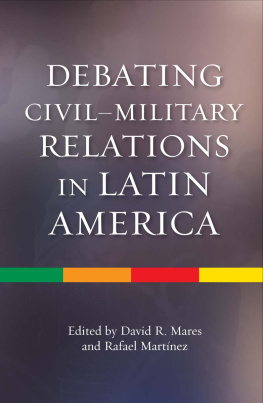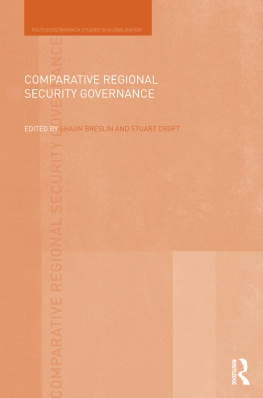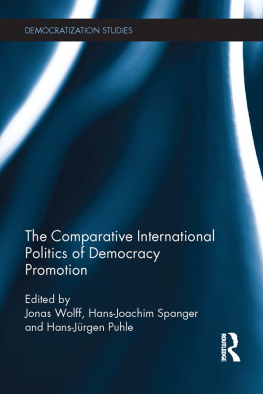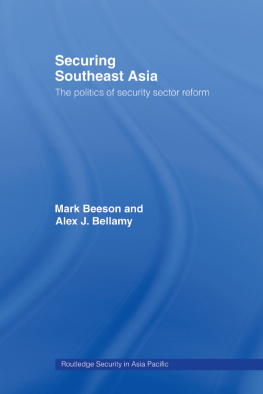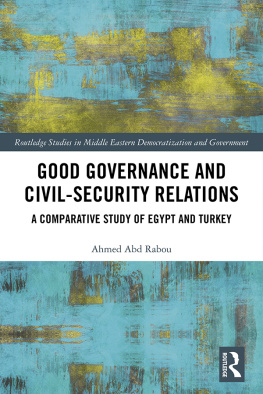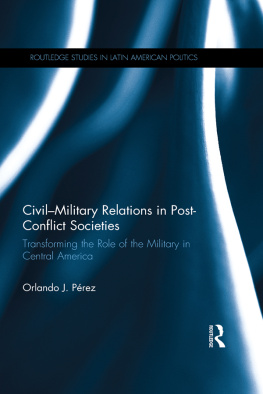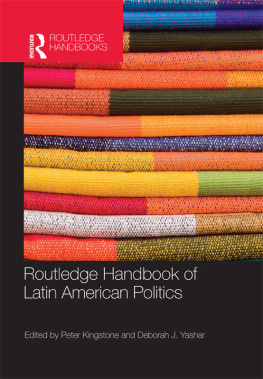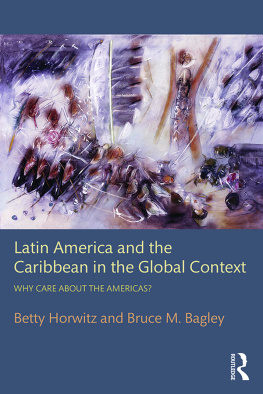There is remarkably little written in English on how the U.S.-sponsored international war on drugs has played out in Argentina. This timely book helps to fill this huge gap, appropriately framing the case in regional comparative perspective.
Peter Andreas, Brown University; author of Smuggler Nation: How Illicit Trade Made America
Cutronas superbly researched and well written study of drug policies in Argentina is a pioneering work on this understudied subject in the Southern Cone countries and required reading for anyonethe general public, students, and specialists alikeinterested in the growing problems of drug consumption, drug trafficking, and drug-related crime, violence, and corruption in his country.
Bruce M. Bagley, University of Miami
Challenging the U.S.-Led War on Drugs
Challenging the U.S.-Led War on Drugs explores the cases that have resisted the U.S. pressure to adopt a militarized approach to fight against drug trafficking in Latin America and the Caribbean.
Through a sweeping narrative history from the recovery of democracy in 1983 to the present, Cutrona applies international relations and comparative politics theories to understand Argentinas different trajectory vis--vis the rest of the region. The author demonstrates that in broad questions of vulnerability to U.S. pressure, external factors often play a secondary role in explaining either balancing/resistance or bandwagoning/acceptance of the U.S. security agenda in the Americas. Emphasizing the role of domestic-level politics, Cutrona identifies the subordination of the military to civilian oversight, the transition outcome, the system of check and balances, and the role of civil society actors such as social movements, epistemic communities, and norm entrepreneurs as Argentinas most relevant sources explaining defection from Washingtons main dictates to combat drug trafficking.
Sebastin Antonino Cutrona is a professor at Universidad Nacional de La Rioja, Argentina. His research interests mainly consist in Latin American politics, organized crime, and drug trafficking.
Routledge Studies in Latin American Politics
| 8 | Transnational Activism and National Movements in Latin America
Bridging the Divide
Edited by Eduardo Silva |
| 9 | Democracy, Revolution and Geopolitics in Latin America
Venezuela and the International Politics of Discontent
Edited by Luis Fernando Angosto-Ferrndez |
| 10 | Transforming Brazil
A History of National Development in the Postwar Era
Rafael R. Ioris |
| 11 | Pharmaceutical Autonomy and Public Health in Latin America
State, Society, and Industry in Brazils AIDS Program
Matthew Flynn |
| 12 | CivilMilitary Relations in Post-Conflict Societies
Transforming the Role of the Military in Central America
Orlando J. Prez |
| 13 | Re-Imagining Community and Civil Society
In Latin America and the Caribbean
Edited by Gordana Yovanovich and Roberta Rice |
| 14 | Revolutionary Violence and the New Left
Transnational Perspectives
Edited by Alberto Martn lvarez and Eduardo Rey Tristn |
| 15 | BusinessState Relations in Brazil
Challenges of the Port Reform Lobby
Mahrukh Doctor |
| 16 | The Politics of Capitalist Transformation
Brazilian Informatics Policy, Regime Change, and State Autonomy
Jeff Seward |
| 17 | Negotiating Trade Liberalization in Argentina and Chile
When Policy creates Politics
Andrea C. Bianculli |
| 18 | Understanding Cuba as a Nation
From European Settlement to Global Revolutionary Mission
Rafael E. Tarrag |
| 19 | Challenging the U.S.-Led War on Drugs
Argentina in Comparative Perspective
Sebastin Antonino Cutrona |
First published 2017
by Routledge
711 Third Avenue, New York, NY 10017
and by Routledge
2 Park Square, Milton Park, Abingdon, Oxon, OX14 4RN
Routledge is an imprint of the Taylor & Francis Group, an informa business
2017 Taylor & Francis
The right of Sebastin Antonino Cutrona to be identified as author of this work has been asserted by him in accordance with sections 77 and 78 of the Copyright, Designs and Patents Act 1988.
All rights reserved. No part of this book may be reprinted or reproduced or utilized in any form or by any electronic, mechanical, or other means, now known or hereafter invented, including photocopying and recording, or in any information storage or retrieval system, without permission in writing from the publishers.
Trademark notice: Product or corporate names may be trademarks or registered trademarks, and are used only for identification and explanation without intent to infringe.
Library of Congress Cataloging in Publication Data
Names: Cutrona, Sebastin Antonino, author.
Title: Challenging the U.S.-led war on drugs : Argentina in comparative perspective / by Sebastian Antonino Cutrona.
Description: New York, NY : Routledge, 2017. | Series: Routledge studies in Latin American politics ; 19 | Includes bibliographical references and index.
Identifiers: LCCN 2016043493 | ISBN 9780415791885 (hbk)
Subjects: LCSH: Drug controlArgentinaHistory. | Drug controlUnited StatesHistory. | Drug trafficArgentinaHistory. | Internal securityArgentinaHistory. | ArgentinaPolitics and government1955- | ArgentinaMilitary policy. | ArgentinaForeign relationsUnited States.
Classification: LCC HV5840.A7 C87 2017 | DDC 363.450982dc23
LC record available at https://lccn.loc.gov/2016043493
ISBN: 978-0-415-79188-5 (hbk)
ISBN: 978-1-315-21218-0 (ebk)
Typeset in Times New Roman
by Wearset Ltd, Boldon, Tyne and Wear
Between 2000 and 2010, more than one million people died in Latin America as a result of criminal violence. The murder rate in the region grew by 11%, registering more than 100,000 homicides per year (United Nations Development Programme, 2013). Latin America and the Caribbean are home to eight of the top ten most violent countries and 40 of the worlds 50 most dangerous cities. Just Brazil, Colombia, Mexico, and Venezuela account for one in four violent killings around the world each year (Muggah, 2015). This trend has transformed Latin America into the worlds most violent region, according to the United Nations Development Programme (2013). In Mexico alone, for example, the number of homicides increased by 24% during the Caldern administration (20062012) (Molzahn, Rodriguez Ferreira, & Shirk, 2013), accounting for approximately 70,000 deaths in six years (Proceso, 2013). Even though the vast deterioration of security has been grounded on multiple and diverse factors, perhaps one of the most critical driving forces behind this regional trend has been the transformation of the drug trade.
Yet drug trafficking is not the only force fueling violence in Latin America and the Caribbean. The way governments have framed and responded to this phenomenon has been a critical part of the story. Indeed, before the United States (U.S.) internationalized the so-called war on drugs in the mid-1980s, the levels of violence in the region were practically insignificant. Despite billions spent on counter-narcotics efforts, however, the consequences of Washingtons strategic choices are visible: consumption has globalized, the areas of cultivation have rapidly proliferated, and organized crime has fragmented (Bagley, 2012). Furthermore, the U.S. approach to illicit drugs has produced several collateral damages, including negative impacts on democracy, political instability, human rights, civilmilitary relations, the economy, and even the environment.

